Month 2:29, Week 4:7 (Shibi'i/Sukkot), Year Day 056
2Exodus 10/40, Omer Count: Sabbath #6/7
Gregorian Calendar: Thursday 18 May 2023
Book of Revelation LIV:
The Seven Shofar Judgments VII
Interlude III: Messages of the Six Malakim,
Part A. Babylon & the Call to Endurance
(Revelation 14:6-13)

Continued from Part 54
Introduction
Shabbat shalom kol beit Yisra'el and Mishpachah and welcome back to our study of the Book of Revelation and to Part LIV (54) and to the very last parts of the third Interlude. Next week we shall look at the Great Harvest (vv.14-20) and in a fortnight (two weeks) we shall begin our study of the third and final cycle of seven plagues.
The Assembly of the Firstborn
Last week we finished our study of Yahweh's elect 144,000 spiritual warriors of the Chavurat Bekorot or Assembly of the Firstborn (Heb.12:23), Yahweh's elect who have refused to be trapped by the Beast's end-time Babylonian system. Instead of the cryptic name of the Beast, though, they carry the Name of the Father and of the Lamb on their foreheads, a feature we will later pick up again in chapter 22, verse 4:
"They (the 144,000) shall see His face, and His Name (Yahweh the Father & Yahweh the Son = the Lamb, Yah'shua/Jesus) shall be on their foreheads" (Rev.22:4-5, NKJV)
The 144,000
As such then, they are pure, undefiled and beautiful in the eyes of Elohim (God). We also learned that they are not single, unmarried, celibate orthodox Jews but the elect firstborn males and leadership of all the regathered twelve tribes of Messianic Israel and their wives. We understood the link between them and the remnant, and the restoration of Jerusalem in the Book of Isaiah, chapter 4, and that in total number there would be over a million of them, not just the 144,000 males but their plural wives too. Finally, we understood that there was also a symbolic meaning to the number '144,000' (in addition to a literal one), a symbolism that identifies them as being the Elect of New Covenant, Messianic Israel. Unlike those who take the Mark of the Beast and are full of arrogant lies, fornication and adultery, who oppose the fullness of marriage, lust after and impose unnatural relationships, the 144,000 are known for their integrity of speech and for engaging in pure patriarchal marital holiness.
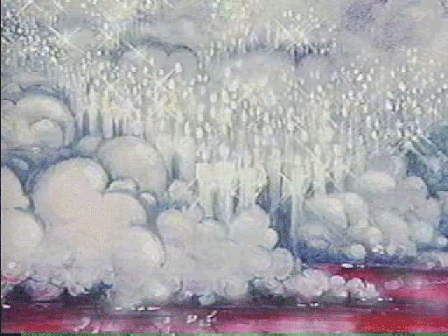 Thev 144,000 are pure, undefiled and beautiful in the eyes of Yahweh
Thev 144,000 are pure, undefiled and beautiful in the eyes of Yahweh
REVELATION 14:6-13
The rest of chapter 14 has a procession of 6 malakim (angels) bringing various messages from Yahweh-Elohim to men. We are now going to read the first 3 of these in verses 6 to 13:
"6 Then I saw another malak (angel) ('Messenger' - AENT) flying in the midst of heaven ('midair' - NIV; 'mid-heaven' - KNT, JNT, NEB, JBP, NASB; 'overhead' - JB; 'directly overhead' - ESV) (Rev.8:3; 19:17), having ('sent to announce' - JB, 'holding' - JBP; 'and with blood, he had' - AENT) the ('/an' - KNT, NRSV, NEB) everlasting ('eonian' - CLNT) gospel (Besorah, Good News) to preach to those who dwell on ('the inhabitants of' - HRV) the earth (Rev.3:10) -- to every nation, tribe, tongue, and people (Rev.13:7) -- 7 saying with a loud voice, 'Fear ('Reverence' - Barcaly) Elohim (God) (Ps.34:9; Rev.15:4) and give glory to Him ('pay Him homage' - NEB; 'adore you Him' - AENT) (Rev.11:13), for the hour of His judgment has come; and worship Him who made (Rev.10:6) heaven ('the heavens' - NIV) (Ex.20:11; Ps.146:6) and earth, the sea and springs ('fountain' - HRV) of water.' (Rev.8:10; 16:4)
"8 And another malak (angel) followed, saying, 'Babylon ('Bavel' - HRV) is fallen (Is.21:9; Jer.51:8; Rev.16:19; 17:5; 18:2,10), is fallen, that great city, because she has made all nations drink of the ['maddeningĘ' - NIV; 'fierce' - NEB] wine of the wrath ('anger' - KNT; 'passion' - ESV) of her fornication ('sexual immorality' - HRV, ESV; 'adulteries' - NIV; 'passionate unfaithfulness' - JBP; 'passion of her immorality' - NASB) (Rev.17:2,4; 18:3,9).'
"9 Then a third malak (angel) followed them, saying with a loud voice, 'If anyone worships the beast ('monster' - KNT; 'animal' - JBP) (Rev.13:12) and his image ('statue' - NLT) (Rev.13:14), and receives his mark on his forehead ('between the eyes' - HRV) (Rev.13:16) or on his hand, 10 he himself shall also drink of the wine of the wrath ('fury' - NIV, JNT; 'anger' - KNT; 'passion' - JBP) of Elohim (God) (Is.51:17; Jer.25:15), which is poured out full strength ('undiluted' - NLT, JNT, JB, NEB, JBP, Barclay; 'unmixed' - NRSV) into the cup of His indignation ('wrath' - NIV; 'rage' - JNT) (Jer.51:7; Rev.18:6). He shall be tormented ('tortured' - KNT, JBP) with fire and brimstone ('sulphur' - HRV, JBP) (Rev.9:17) in the presence of the qadosh (holy, set-apart) malakim (angels) and in the presence of the Lamb. 11 And the smoke of their torment ('torture' - KNT) ascends forever and ever (eons of the eons - CLNT) (Is.34:10; Rev.19:3); and they have no rest ('respite' - KNT, NEB, JBP) day or night (Rev.4:8), who worship the beast ('monster' - KNT; 'animal' - JBP) and his image (v.9; 13:12), and whoever receives the mark of his name.' (Rev.13:17) 12 Here is the patience ('patient endurance' - NIV; 'perseverence' - JNT, NASB; 'endurance' - NRSV, ESV, JBP; 'constancy' - JB; 'fortitude' - NEB; 'gallantry' - Barclay) (Heb.6:12) ['needed' - JNT] of the qodeshim (saints, holy, set-apart ones) (Rev.13:10); here are those who keep ('obey' - NIV; 'continue to maintain their obedience to' - Barclay) the mitzvot (commandments) of Elohim (God) (the Torah (Jn.14:15) and ['exercise' - JNT] the faith ('trust' - HRV) of ('remaining loyal to' - NEB, Barclay) Yah'shua (Jesus).
"13 Then I heard a voice from heaven saying to me, 'Write: '[From henceforth' - JBP] Blessed ('happy' - JB, JBP) are the dead who die ['united' - JNT] in ('with' - JNT) the Master [Yah'shua/Jesus] (1 Cor.15:18; 1 Thes.4:16) from now on. Yes,' says the Ruach (Spirit) (Rev.2:7; 22:17), 'that they may rest from their labours and their works ('deeds' - NRSV, ESV, JBP; 'good deeds' - JB) follow them" (Rev.14:6-13, NKJV).
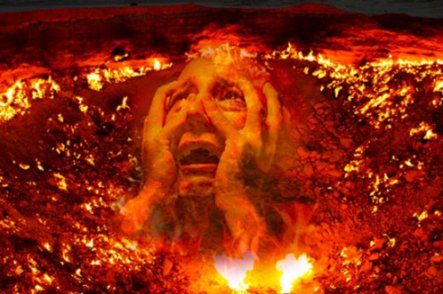 The torment of those who choose receive the beast's mark will be terrible
The torment of those who choose receive the beast's mark will be terrible
The First Three Malakim
Starting at verse 6, then, the rest of chapter 14 has a procession of 6 malakim (angels) bringing various messages from Yahweh. Today we will only consdier 3 of these:
The First Malak - Fear & Worship Yahweh
- 1. The first malak (angel) which calls for the fear [1] and worship of Elohim (God) with a reminder that the Besorah (Gospel, Good News) is still available to save anyone from the coming wrath;
The Second Malak - The Fall of Babylon
- 2. The second malak (angel) announces the fall of Babylon. Here we have another 'anticipation' moment since this is the first time such a place has been mentioned. Everything about this is made much clearer later in chapters 16-17. When we reach there, we'll be better able to understand exactly what 'Babylon' is; and
The Third Malak - Terrible Consequences of Rebellion
- 3. The third malak (angel) warns believers of the terrible consequences of giving in to the pressures of the final one-world antichrist totalitarian system. The language is that of hell; and hell, so long as it exists, is a place of unceasing torment. And torment is the same word used to describe the experience of the devil, and antichrist and the false prophet, in Revelation 20:10. In other words, these three will share the same fate of those who surrendered to them in mortality. And the fact that the qodeshim (saints, set-apart ones) have the possibility of falling and finding themselves in this dreadful place is underlined by a call to "patient endurance" immediately after the warning in verse 12, which is a repeat of verse 10 of the previous (13th) chapter which you will remember read:
"He who leads into captivity shall go into captivity; he who kills with the sword must be killed with the sword. Here is the patience (constancy, endurance) and the faith of the qodeshim (saints, set-apart ones)" (Rev.13:10, NKJV).
Both contexts recognise that some will pay for their loyalty to Yahweh with their lives. And for them a special beattitude is written, the second of the 7 Apocalypse Beatitudess that we studied right at the beginning of this Book of Revelation course:
"Blessed are the dead who die in [and for] the Master [Yah'shua/Jesus] from now on" (Rev.14:13, NKJV).
And this blessing is twofold: they can now rest from their earthly labours, and since the record of their loyalty has been kept, look forward to a great reward too. Even those who die of natural causes at this time will will enjoy this same blessing. Please note that this scripture should not (as commonly happens) be used for funeral services because the promise of this reward comes with a qualification: "from now on" - in other words, this promise is only good from the beginning of the global reign of the Beast, i.e. the Great Tribulation period of time.
Choosing Between High and Low Roads
The need to develop the quality of endurance is guarantee-built into us from the moment we are born into this difficult and challenging mortal sphere. This means that the choices we have to make when facing these challenges are necessary and positively designed for our character development: 'no pain, no gain' as the familiar saying goes. And the greater the challenge, often the greater the pain, and therefore the greater the potential gain. Moreover, woven into the tapestry of life by our loving Creator is the possibility to acquire these blessings the shorter, harder, and more painful way (the 'high road') or the longer, less challenging, and less painful way (the 'low road')...and any number of ways inbetween. Of course, Yahweh foreknows which of the high and low roads we will choose and pre-designs the structure and content of our lives knowing what will meet those personal disposition-choices the best. Moreover, there is no way we can possibly figure out, except perhaps - sometimes - in retrospect, whether we chose the best solution to a problem or not. This is why some people take longer to work out certain issues than others. We have not been deliberately disadvantaged with 'malice aforethought' by Yahweh - He has 'simply' engineered the best set of choices we could possibly have through life circumstances given the bigger choices He knew we would make earlier [2].

No Individual Predestination
In so many ways, then, the Book of Revelation - and especially this segment - repudiates the cold and irresistable individual predestinationism proposed by John Calvin. If we are to understand John's symbolic usage here we have to first of all carefully note the deliberate link to Babylon in verse 8:
"Babylon the great has fallen! She has fallen! She is the one who made all the nations drink the wine of the anger that comes from her fornication" (Rev.14:8, KNT).
First Mention of Babylon
This is the very first time 'Babylon' is mentioned in the Book of Revelation. It gathers up, as it were, in this brief preliminary announcement, the whole of chapters 17 & 18 that we are to come to still, because the words of this malak (angel) are prophetic and look forward to the pouring out of the last Bowl or Vial. The righteous want to see this 'Babylon' judged and gone forever! The judgment on 'Babylon', whatever at this stage the word may represent, closes up the whole series on Yahweh's judgments. Chapters 17:1-3 and 18:2-3, when we get to them, are identified by the announcement of this second malak (angel).
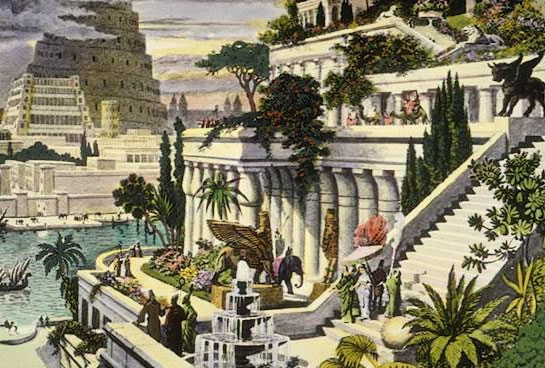 Ancient Babylon
Ancient Babylon
Babylon's Fornications
So while the action of the first malak (angel) goes back to a time prior to chapter 13, the words of the second one takes us on beyond the end of that chapter. If we take the Greek word thumos as meaning 'inflammatory' or 'exciting', as if often does when used to describe intoxicating wine, then the difficulty in understanding this passage is taken away. Babylon's "fornications" therefore refer us back to the prevailing religion of the time, as we saw in verses 4 & 5 where we find the 144,000 having nothing to do with its abominations because they are pure and holy and do not embrace 'The Lie' of the 'Infernal Three' (Satan, Antichrist and the False Prophet). It is this moral and spiritual filthiness and impurity that is the reason for Babylon's judgment. And without wishing to be a 'spoil-sport', I'm afraid we must wait until chapter 17 before examining this in any depth. There are other important things we must first tackle here. Nevertheless this will not stop us from looking back to learn from similar time periods where endurance has been required of Elohim's (God's) people.
When Babylon First Started Becoming a Problem for Israel
Our first port-of-call is, logically enough, ancient Babylon itself which only starts coming into prominence in the Tanakh (Old Testament) as a real source of problems for Israel in 2 Kings 17:24 - there's only a passing reference to this ancient civilisation in Genesis 10:10 where we find it part of a list of city states that Nimrod ruled. Babylon, the capital of the the great empire that swallowed up the remaining rebellious southern tribes of Israel in 597 BC (principally Judah, Benjamin and Levi), was the city that remained ever after in Judahite (Jewish) memory as the epitome and paradigm of idolatry, immorality and shere cruelty. Anyone who knows anything about the Book of Revelation knows that that 'Babylon' is used as a symbol later in the book, in chapters 16-18, where John without a shadow of a doubt means 'Rome'...at least for his day, in his particular part of the unwinding 'prophetic spiral'. However - and this we need to make clear - what he actually means is 'Rome-seen-as-Babylon'; he is seeing Babylon through the lens, in particular, of two of the greatest Tanakh (Old Testament) prophetic books which means we must understand what they have to say about the subject material clearly.
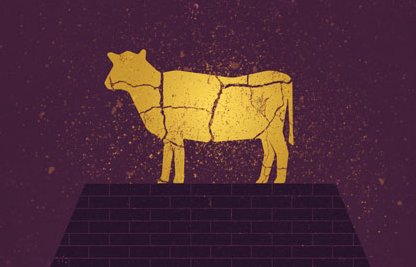 Babylon was the epitome of idolatry, immorality & cruelty
Babylon was the epitome of idolatry, immorality & cruelty
Isaiah's Account of Judah's Babylonian Exile
The first of these is Isaiah. The great central section of the book, chapters 40-55, is addressed to the Israelites in exile who have almost given up hope. Babylon, where they have been taken into exile, seems so great and all-powerful. Babylon's gods seem to have won, and Yahweh, Israel's Elohim (God), appears to be just another god, and now a failed one at that, reminding me a bit of modern liberal panspermia scholars and popular writers like Italian Mauro Biglino (recent author of Gods of the Bible), Zechariah Sitchin (author of the Anunnaki Chronicles) and Swiss popular writer, Erich von Däniken (author of Chariot of the Gods) who view Yahweh in exactly the same way as an entity of no real consequential. Indeed, Biglino, like the other liberals, believes Yahweh was one of a team of rival alien astronauts who became earth's rulers and then fought it out for ascendency among themselves. But this is to fundamentally misunderstand the set-up of the biblical narrative for the other 'gods', so-called, are consistently portrayed as imaginary, whereas Yahweh is all-powerful choosing to act in His own way and timing.
 Yahweh isn't one of many rival 'gods' who came from outer space
Yahweh isn't one of many rival 'gods' who came from outer space
The Servant-Master Elohim
In magnificent poetry scarely equalled by anyone for its combination of power and tenderness, the navi (prophet) Isaiah expounds the greatness and the covenant-faithfulness of Yahweh. He is the Creator of heaven and earth and He is not about to apparently be outdone by the puny fake gods of Babylon, anymore than He was by those of Egypt during the First Exodus. He promises to rescue His people, re-establish the covenant and renew the whole Creation. And we're told He will perform this rescue of His people through the work of One crypically referred to as 'the Servant', reminding me of my first visionary experience in Malaysia as a boy, before I became a believer later on in life, where He was referred to as 'the Master'. And so He abolutely is - both Master and Servant - the epitome of true divine Maleness which the false gods of today's world and their human slave-followers hate so vehemently.
The Four Servant Poems of Isaiah 4-55
Four sub-poems emerge from the flow of prophecy in Isaiah 40-55:
- 1. First of all, they highlight the Servant's mission to rescue Israel and bring justice to the world (Is.42:1-9);
- 2. Then His hard and apparently unfruitful work which will yet reveal Yahweh to the nations (Is.49:1-7);
- 3. Then His readiness to hear Yahweh's voice and His consequent suffering and patience (Is.50:4-9); and
- 4. Finally, His shameful death, bearing the sins of His people, leading to His restoration and vindication (Is.52:15-53:12).
Afflictions Meeted Out Will Be Returned Back
Surrounding these four poems are oracles of doom on Babylon. She has, according to Isaiah, made her captives drink "the cup of wrath" to the dregs, but Elohim (God) will take it from them and give it to Babylon instead (Is.51:17-23). The oppressors will fall victim to the very wicked systems they themselves devised. Evil will bring its own reward! Remember that always; and then, when you see the rôles of oppression reversed by Divine Justice, rejoice, because you're going to see that happen in our day too! Today's wicked cabals are going to get their come-uppance (just desserts)!
An Eternal Gospel
And so it's in that context, by way of introduction to the 4th 'Servant Poem', the navi (prophet) announces the arrival of the herald with "good tidings" or "good news" (Is.52:7)...just as John tells us in today's segment when he sees a malak (angel) carrying "an eternal gospel" - please notice the word "an" (KNT, NRSV, NEB) not 'the' as most English translations render it, modifying the original because it doesn't 'fit' with their preconceived doctrine. So what is this 'good news'? And why the indefinite article ('an') in front of it?
The Gospel is Far Larger in Scope Than Personal Salvation
Protestants in particular, please listen carefully. For many today, the Christian 'good news' or 'gospel' is a message about them - as individuals: God loves them, God forgives them, God promises them a blissful place in 'heaven'...which, of course, is all absolutely true BUT, without diminishing the personal meaning (which I am absolutely not doing), most of the summaries of the 'good news' (basar, besorah) in the Bible are much larger in scope than 'them'.
Paul's Summary of the Good News
How, for instance, does Paul summarise the 'good news' in his first letter to the Corinthians? Let's see:
"For what I received I passed on to you as of first importance: that Christ died for our sins according to the Scriptures, that He was buried, that He was raised on the third day according to the Scriptures, and that He appeared to Peter, and then to the Twelve. After that, He appeared to more than five hundred of the brothers at the same time, most of whom are still living, though some have fallen asleep. Then He appeared to James, then to all the apostles, and last of all He appeared to me also, as to one abnormally born" (1 Cor.15:3-8, NIV).

The Saving Events of the Good News
Paul here summarises the 'good news' in terms of the saving events of Yah'shua's (Jesus') scripture-fulfilling death and resurrection. Or on Yah'shua's (Jesus') Davidic descent, His public recognition as "son of Elohim (God)" through the resurrection, and His universal lordship:
"Paul, a servant of Messiah Yah'shua (Christ Jesus), called to be an apostle and set apart for the gospel of Elohim (God) - the gospel He promised beforehand through His nevi'im (prophets) in the Holy Scriptures regarding his Son, who as to His human nature was a descendant of David, and who through the Ruach haQodesh (Spirit of holiness) was declared with power to be the Son of Elohim (God) by his resurrection from the dead: Yah'shua the Messiah (Jesus Christ) our Master (Lord). Through Him and for His name's sake, we received grace and apostleship to call people from among all the Gentiles to the obedience that comes from emunah (faith). And you also are among those who are called to belong to Yah'shua the Messiah (Jesus Christ)" (Rom.1:1-6, NIV).
Three Elements & an Immediate Consequence
So for Isaiah, there are three elements immediately mentioned, with a further immediate consequence. John seems to be very aware of this! So what are these Good News 'elements' that must accompany any proclamation of the Besorah (Gospel, Good News) of our Master, Yah'shua the Messiah (Jesus Christ)?
- 1. Your Elohim (God) reigns! This message, announced to the exiles in Babylon, can only mean one thing: your Elohim (God), YAHWEH, has won the victory over Babylon, and you are now free to go home. Jerusalem will be rebuilt (Is.52:7,9);
- 2. 'Your Elohim (God) is coming back!' Yahweh had, it seemed, abandoned the Temple in Jerusalem when the Babylonians closed in to attack. But now He would return, publicly and visibly (Is.52:8; 40:5); and
- 3. 'Elohim (God) is doing a powerful and public work of rescue! (Is.52:10). All the nations would see that Israel's Elohim (God) had saved His people from their plight.
The Fall & Return
So what happened? Babylon fell! The exiles went back home to the Promised Land...but nobody ever said that Yahweh had finally come back - that part of the prophecy was not fulfilled when the first exile ended. But the early Christians/Messianics believed - and they believed that Yah'shua (Jesus) believed - that Yahweh's glory was fully and finally revealed when Yah'shua (Jesus) died on the cross as the innocent Lamb:
"He was oppressed and afflicted,
yet He did not open his mouth;
He was led like a lamb to the slaughter,
and as a sheep before her shearers is silent,
so He did not open his mouth" (Isa.53:7, NIV).
All of this is vitally important as the complex scriptural background to Revelation 14 because all scripture must be interpreted and understood out of all that came before it! So study your Bibles from Genesis to Revelation!
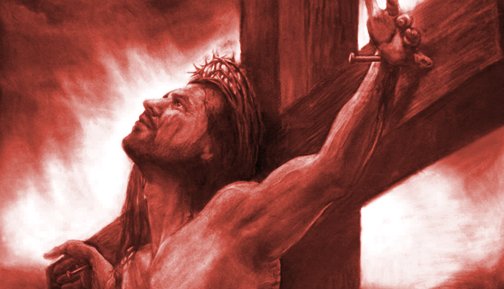 Yah'shua the Messiah, the suffering Servant of Isaiah
Yah'shua the Messiah, the suffering Servant of Isaiah
Jeremiah's Judgments
And that brings us to the other important passage, and that is to be found in the Book of Jeremiah. You are all familiar with the tragic life of the navi (prophet) Jeremiah who seems to have spent most of his life in the terror and horror of the Babylonian invasion and its aftermath, the sorrow of exile. He saw some appalling sights and experienced just how attrocious human behaviour can be. And at the end of his book, he solemnly pronounces Yahweh's judgment on the wicked nations that have brought such terrible things to pass. He has got short oracles against Egypt, the Philistines, Moab, the Ammonites, and Damascus. But then, in chapter 50, he comes to...Babylon. Two long chapters of sustained condemnation show where the book's emphasis lies. Perhaps only those who have lived through a generation under a desperately cruel and inhumane régime can even begin to understand why those chapters needed to be written. But perhaps those who think hard about the justice of Elohim (God), and the very great need now for some sort of deliverance for the billions of people in a world filled with injustice and diabolical cruelty, and maybe we are able to glimpse part of the answer and why Revelation 14 says what it does.
Monstrous, Wicked Rule
The terrible oppression and injustice that we experience now and have experienced ever since Revelation 14 was penned - the sexual degradation, the immorality and exploitation - is 'Babylon' - that's what is meant by 'Babylon' on a global scale. It may have been identified in John's day as a particular political entity - the Roman Empire - and we may be able to point to many similar 'Babylon's' over the last 2,000 years including religious, fascist and atheistic-communist tyrannies, and even point to the latest one - the 'Globalist Empire' - which is ripening now even as I speak, with some saying the 'United States' or some other country is 'Babylon', whilst failing to understand that 'Babylon' is here being used on a much greater scale to include all of these and more. 'Babylon' is a system of oppression and exploitation, whether capitalist or socialist, religious or atheistic, is makes no difference, because they're all spiritually one-and-the-same. Whether it was:
- a. the original, literal Babylon; or
- b. the Roman Empire of the first century AD; or
- c. the wicked world system; or
- d. the ungodly in general
- it's all a monstrous, wicked rule.
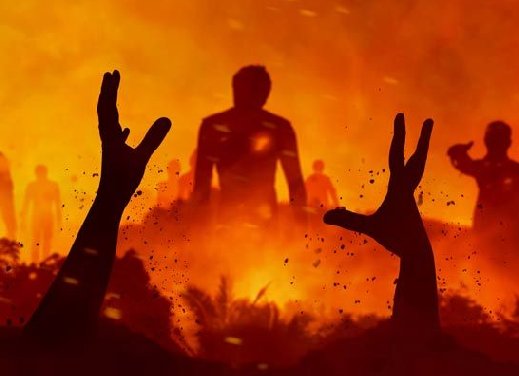 The Babylonian system is one giant, monstrous wicked rule
The Babylonian system is one giant, monstrous wicked rule
The Whore System
The great promise and hope of Revelation 14 is that Yahweh is going to untangle and sort out this terrible mess that mankind has got himself into. That's the first understanding we take away from this segment. The second one is that Babylon "is fallen" - it was 'fallen' from the beginning, because it could never last, and it is here personified as a drunken and sexually immoral woman, representing collectively every human being trapped in this system. 'She' has made the nations 'drunk' - oblivious to their self-destructive behaviour, and the more they drink of her 'wine', the worse their condition becomes. Indeed, they stop caring altogether; and when they do that, they are, in effect, choosing to climb aboard their final death-ride. You know, when nazi Germany fell in May of 1945, many of the functionaries were partying and having an orgy right up to the moment the Soviet troops burst in to the Reichs Chancellery. 'Eat, drink, and be merry, for tomorrow we die,' was what they believed and did. They were acting as though they didn't have a care in the world. Indeed, they didn't care - they just wanted to enjoy the war for as long as they possibly could because they knew that, when it ended, it was the end for them - quite literally in many instances. And so it will be with that great part of humanity that rejects Christ's offer of salvation and elects to embrace the world system that is 'Babylon'. They will waltz carefree into hell at which point they will immediately start to desperately care...and beg to have time reversed so they might choose differently. But it will be too late.
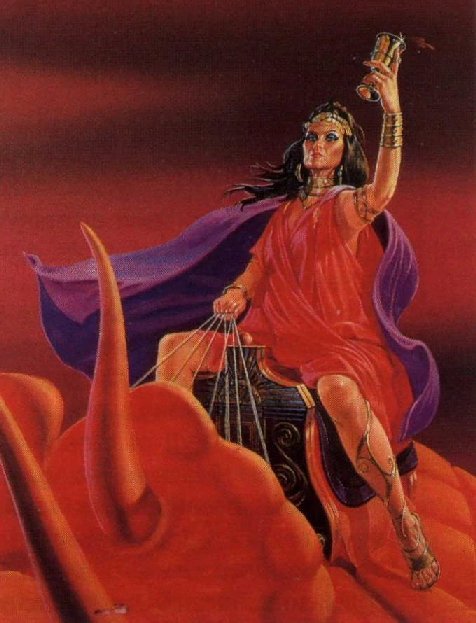 The Whore of Babylon
The Whore of Babylon
The Justice of Yahweh's Judgment
Thirdly and finally, Yahweh's judgment will be seen to be absolutely and totally FAIR. It will be completely JUST. No one will be crying out, as we do at the Babylonian system, 'That's not fair!' For all those who have lived in a world of horror, torture and squalour not of their own choosing or by their own design or the result of their own conscious rebellion against Him, Elohim (God) will see them right - the ultimate and only 'social justice' that there will ever be seen to be done, because man cannot deliver it. Gone will be Babylon's arbitrary justice and unequal scales.
It is Not for Us to Assign Judgment
There's one other very important point I want to make for those who think they have some sort of right and duty to go around, with pointing figer, 'deciding' what category of judgment everyone else but themselves will fit into. It's none of their affair. It's none of our affair. Neither John, nor we, nor anyone else, knows who, if anyone, comes into the category described in verses 9-11. Let me read them to you again:
"They were followed by a third malak (angel), who also spoke in a loud voice: 'If anyone worships the monster (beast) and its image, or receives its mark on their forehead or their hand, that person will drink the wine of Elohim's (God's) anger, poured neat (concentrated) into the cup of His anger, and they will be tortured with fire and sulphur before the qadosh malakim (holy, set-apart angels) and before the Lamb. The smoke of their torture goes up for the æons (ages) of the æons (ages). Those who worship the monster (beast) and its image, and those who receive the mark of its name, will have no respite, day or night" (Rev.14:9-11, KNT & CLNT).
A Word to the Hellfire-and-Damnation Folk
Now we have to be very, very, very careful with this passage because it's so easily misinterpreted and misapplied, and on so many different levels too. This means I am going to have put a gag on all the 'hellfire-and-damnation' preachers and their followers who may be listening - a gag to match the blindfolds they are almost certainly already wearing. This is an awful scene, with evocative and scary words being used, like 'torture' and 'torment', 'neat' and 'concentrated', 'fire' and 'sulphur' and other familiar hellish language. Indeed, this passage is one of the prooftexts - if not the - prooftext - that is commonly used to justify the belief of many for of eternal burning and torture in a fiery hell that has scared millions into the 'church' and allegedly into salvation. I've met lots of these people in my life and in my experience whatever it was that drove them into the 'Kingdom' in many cases also drove love out with it, leaving behind yet another kind of 'Babylon' - a religious one, a 'Christian' one, were it even possible to pair these two ideas together.
Hell is Not a Place You Want to Go To
I don't have time to get into a fullblown discussion on this very important topic today. It is a subject that has created a whole breed of abusive religious creeds and practices - you can study this out fully for yourself on our Hell website. Having said that, make no mistake about what I am saying here - there is a very literal torment that everyone who has had a truly seared conscience will have experienced at least once in his or her lifetime. Hell is both a condition and a place simply because to have a condition or inner state means you have to be somewhere. And as 'like attracts like', so the tormeted will be simultaneously attracted to each other and repelled by those filled with the Ruach haQodesh (Holy Spirit), just as the wicked are today. So 'hell' (or Sheol and Hades in Hebrew and Greek, respectively), to use the English word (even though it has been invested with a meaning way, way beyond the original biblical concepts thanks to Catholics and writers like Dante whose over-fertile imagination populated this dreadful world with every horrible thing he could dream of and basically made it an extension of his own biases and fears)- this is a real place and it is separate from 'Paradise' or 'Heaven' or the 'Garden' and this is a place and/or condition you absolutely do not want to find yourself in - ever...not even for 5 seconds. Because Yahweh once showed it to me...and I couldn't even bear one second.
 You don't want to go to hell for even one second, let alone for thousands of years
You don't want to go to hell for even one second, let alone for thousands of years
Two Vitally Important Points
I wish to only make two points about this subject and then we'll leave it at that for today:
- 1. Remember that we are principally dealing here, as we are throughout the Book of Revelation, with the symbolic - the pain, the fear, the desperation and horror may be real enough but the instruments used to describe it are not to be taken literally. There's no literal sulphur and no literal fire in hell as there were at Sodom. There is something that belongs to the invisible realm of the inner workings of a man's soul that may remind us of these things, evoking images from earth life and history (like the fire and sulphur that destroyed Sodom and Gemorah). They are designed to be used as leaping boards for the imagination to enable us to relate in some tangible way to a state of being that we cannot even begin to imagine exists, save maybe in the glimpses we may have had of it when, for example, we may have done something awful to wreck a relationship or a life, with all the remorse and guilt that that suddenly created. When we read the language of the Book of Revelation we can only hear the descriptions with awe, and with the recognition that the deep seduction of evil really can swallow people up whole. And John is eager - anxiously eager, as we should be too - to prevent any of Yah'shua's (Jesus') followers being sucked down into that dark whirlpool of wrath...or indeed anyone at all whom we can at all influence through our witness to bring them into the light of redemption. Their part - our part - is to be patient, obedient and faithful, knowing that death itself has been defeated, so as to become now a source, not of cursing but of blessing. Paul simply reiterates the words of John here, telling us that such a noble labour is never in vain:
"Therefore, my dear brothers, stand firm. Let nothing move you. Always give yourselves fully to the work of the Master, because you know that your labour in the Master is not in vain" (1 Cor.15:58, NIV).
- 2. The second point is this, and it all hinges around a Hebrew word, olam - and a Greek word, æon. Translate these wrongly and your whole theology will become distorted, like a building with a fault line running through it causing one half of it to slide down a level. Unfortunately the theological institutions of learning and the Bible translations' committees are almost entirely controlled by those who are trapped by the man-made creeds formulated by their ancestors - creeds that have been weaponised with the threat of excommunication when challenged by those who do not always accept their every word - and consider they are doing Elohim (God) a favour by condemning detractors as heretics and often throwing them out of their churches and disfellowshipping them. (In the old days they burned them alive). When applied to divine punishment, as they are in Scripture, these wrongly translated words provide the ammunition the hellfire-and-damnation preachers rely upon to cajole their frightened listeners into repentance and a hasty recital of the 'Sinner's Prayer'. The problem with this method is that it is antithetical to that of our Messiah, who desires that all souls be authentically drawn or attracted to Him by only one power, and one power alone: the power of love. He does not want us pressed onto Him by slavish fear.
False and Legitimate Fear
Yes, there is a legitimate kind of fear - don't get me wrong - it's called godly, reverential fear (as I have already pointed out) - but there is also an ungodly or slavish kind of fear, which wrong translations of this segment sadly appeal to, and are accordingly exploited by, those unwilling to make a full investment in love toward others and who are willing, in some (Calvinistic) cases, to quickly dismiss those who do not respond positively to their negative brand of fear. The punishment of the wicked is frightful (because that's what a seared conscience confronted with the truth experiences, to then realise that they have rejected the only remedy that will enable them to have that defiled conscienced cleansed - Christ - by, in this case, acceptng the Antichrist's mark and idolatrously worshipping his image) - has passed them by. And that will be a frightful realisation because once that fateful choice has been made, this nightmare won't, in the false narrative, end one day. For if he believes the false translation, he will believe that this nightmare will last forever while he is in a fully awake state: eternal torture, eternal damnation and fire. The whole point in understanding what olam and æon mean is that they don't mean 'everlasting' or 'forever' but for the duration of a fixed period of time - an age. In other words, even though this period of time is very long...maybe centuries or thousands of years, I don't know...it does one day come to an end. There is, finally, universal reconciliation but without reward or any sort of Throne Room life in the presence of Elohim (God) for those who made that fateful choice. For them hell will seem like eternity - never-ending torture.
Redemptive Suffering
A few weeks ago one of two of you got upset with me and categorically refused to accept that those being punished, who received the mark and worshipped the image, would be visible to those in the Throne Room, and challenged me to produce a scripture in support of such an idea, your thought being, 'How could a loving Elohim (God) possibly expect us to watch the suffering of loved ones?' Well, certainly, not to gain any pleasure from it, because Yahweh, Scripture says, takes no pleasure in the death of the wicked (Ezek.18:32; 33:11) and by the same token in anyone's suffering either. No Being of Love possibly could. But now that you know what olam and æon mean, can you perhaps view this a little differently? What, if, after all, the purpose of their suffering were redemptive? We are usually more than willing to sit next to someone in their sick bed who is desperately ill and suffering, whether because of their illness, or injury, or indeed the side-effects of the medicine they're taking, both to comfort them and in the hope they will recover and be restored to their normal self. What if those who "worship the beast and its image" who are being "tortured in fire and sulphur before the holy malakim (angels) and the Lamb" are not juist being punished but being monitored for their progress? What if the torturous experiences, deserved through they absolutely are, are, in fact, remedial in the long-term? What if the purpose of the torment is to burn their wickedness out and so make final reconciliation possible? Did not Christ 'die for all' and not just, as Calvinists claim, 'for the some' - those allegedly 'predestined' to salvation? The whole Torah teaches that 'the punishment must fit the crime' whether it be by fines, whippings or execution. And execution is not only for the benefit of society - for its protection and well-being - but sends the guilty ones back to their Creator to be dealt with, be they murderers, rapists, adulterers or idolaters. They will have "no respite, day or night" until the Cosmic Jubilee.
When the Father is 'All in All'
As with one who has a fever until it breaks, so every minute, hour and day of suffering of the wicked is beneficial to them, however excruciatingly painful. We are all of us going to have loved ones in that state one day but we will have hope because we know how it all eventually ends. Justice will prevail - there is no unfair system of rewards in the next life - but so too will mercy when Yahweh-Elohim calls all of this to an end "so that Elohim (God) may be all in all" (1 Cor.15:28, NIV). There will be peace, no one is going to be annihilated (for those who want to metaphorically 'sweep the wicked under the carpet') or be mercilessly, cruelly and pointlessly tortured forever. For our Heavenly Father to finally be 'in all' means that all must be reconciled with Him. And you cannot be reconciled with someone who no longer exists or who is suffering forever. That isn't how shalom (peace) is made. How this will actually look at the end of the æons, I don't know and I am not going to speculate because it's likely to be wildly off. Maybe it will be even better than I have pictured it. I just know that Yahweh's Davar (Word) never returns to Him void (empty). And I remember especially these words of Paul:
"We have our hope set on the living Elohim (God), who is the Saviour of all people, especially of those who believe" (1 Timothy 4:10, NRSV).
A Tough But Critically Important Subject
We have touched, once again, on a very hard but important subject. Today's segment ends with one of the most solemn warnings in the whole Bible and it has been right that we give it some serious attention. The most important thing to take away, I think, is a clear understanding of why endurance is so important. We face one of the most serious choices of all: to compromise and throw everything away or 'endure to the end' knowing it will be totally worth it. Those who endure will be strengthened and encouraged "to keep the mitzvot (commandments)" of Yahweh and not those of the Babylonian, Beast system. Both make absolute commands and offer no middle way - no possibility of walking between them. We either "keep the faith of Yah'shua (Jesus)" and inherit everything, or we don't, and lose everything. It's that serious, that clear-cut, that unambiguous, that important. And it is better by far to die than to yield to Satan's command; it is better to have the blessing connected with death - even a martyr's death - than to live and come under Elohim's (God's) curse and suffer the vengeance of that fire which will burn, and burn through, until nothing offensive and wicked it left in the darkened soul, apart from the gentle washing of the Saviour's blood. How you deal with that emotionally is not for me to say - that you deal with it is, though, critical. Our feelings must be brought into alignment with truth and not themselves become our life's compass.
Conclusion
We shall be pausing for two days for a Rosh Chodesh message and then be returning a week later to examine the acts of the last three of the six malakim (angels) that conclude the Third Interlude. The Book of Revelation story is reaching a critical phase now - a climax - and one we have been waiting for for a very long time. Along the way personal idols should be burning and making way for more of Yah'shua (Jesus)! That, at any rate, is my hope. Only when, as it is written, "He has taken me to the banquet hall, and His banner over me is love" (Song 2:4, NIV) may we be said to have made it, and to have successfully concluded our journey through mortality. That is part of the Song this book speaks of, the most important part of all: Love (1 Jn.4:8,16). Amen.
Continued in Part 56
Endnotes
[1] Not to be confused with slavish fear - see Fear: Overcoming the Spirit of Slavery
[2] This is all carefully explained in the articles on Mollinism and Agency
Acknowledgements
[1] Tom Wright, Revelation for Everyone - The New Testament for Everyone Commentary Series, Vol.19 (SPCK, London: 2011)
[2] E.W.Bullinger*, Commentary on Revelation (Kregel Classics, Grand Rapids, Michihan: 1984)
[3] David H. Stern, Jewish New Testament Commentary (JNT Publications, Clarksville, Maryland: 1992)
[4] ESV Study Bible (Crossway, Wheaton, Illinois: 2011)
[5] The NIV Study Bible (Zondervan, Grand Rapids, Michigan: 1995)
[6] Ed. J.R.Dummelow, A Commentary on the Holy Bible (MacMillan, London: 1909)
[7] David Pawson, Unlocking the Bible: A Unique Overview of the Whole Bible (Collins, London: 2007)
[8] The Moffatt Translation of the Bible Containing the Old and New Testaments (Hodder & Stoughton, London: 1972)
*E.W.Bullinger was a brilliant Anglican clergyman and scholar whose works merit careful study by serious students of the Bible. He was, however, seriously in error in at least three main areas, namely, (1) he believed the 'Church' has been raptured before the Book of Revelation opens, (2) he believed that the 7 churches in Revelation 2-3 are 7, literal Jewish churches or assemblies yet to come, and (3) he believed in a pre-tribulation, pre-millennial rapture.
APPENDIX
SYNOPSIS OF REVELATION 6-16
The Seven Seals
- 1. White horse - military aggression
- 2. Red horse - bloodshed
- 3. Black horse - famine
- 4. Pale Green/Blanched/Pallid/Sickly-looking horse - disease, epidemics
- 5. Persecution & prayer
- 6. Tremour & terror
INTERLUDE I (Ch.7)
(The 144,000 Redeemed)
- 7. Silence in heaven, listening to prayers which are then answered in a final catastrophe: a severe earthquake I
The Seven Trumpets/Shofars
- 1. Scorched earth
- 2. Polluted sea
- 3. Contaminated water
- 4. Reduced sunlight
- 5. Insects and plague (for five months) (1st Woe)
- 6. Oriental invasion (200 million army) (2nd Woe)
INTERLUDE II (Ch.10-11)
(The Malak with the Little Scroll)
(The Two Witnesses)
- 7. The Kingdom comes, the world is taken over by Yahweh & Yah'shua (Jesus) after a severe earthquake II (3rd Woe)
INTERLUDE III (Ch.13-14)
(The First & Second Beasts)
(The Lamb & the 144,000)
(The Messages of the Three Malakim)
The Seven Bowls/Vials
- 1. Boils on the skin
- 2. Blood in the sea
- 3. Blood from the springs
- 4. Burning by the sun
- 5. Darkness
- 6. Armageddon
- 7. Hailstorm (OB 368:11-12) and severe earthquake III, leading to international collapse
 Click the image for the whole Series
Click the image for the whole Series

 V424
V424
|


